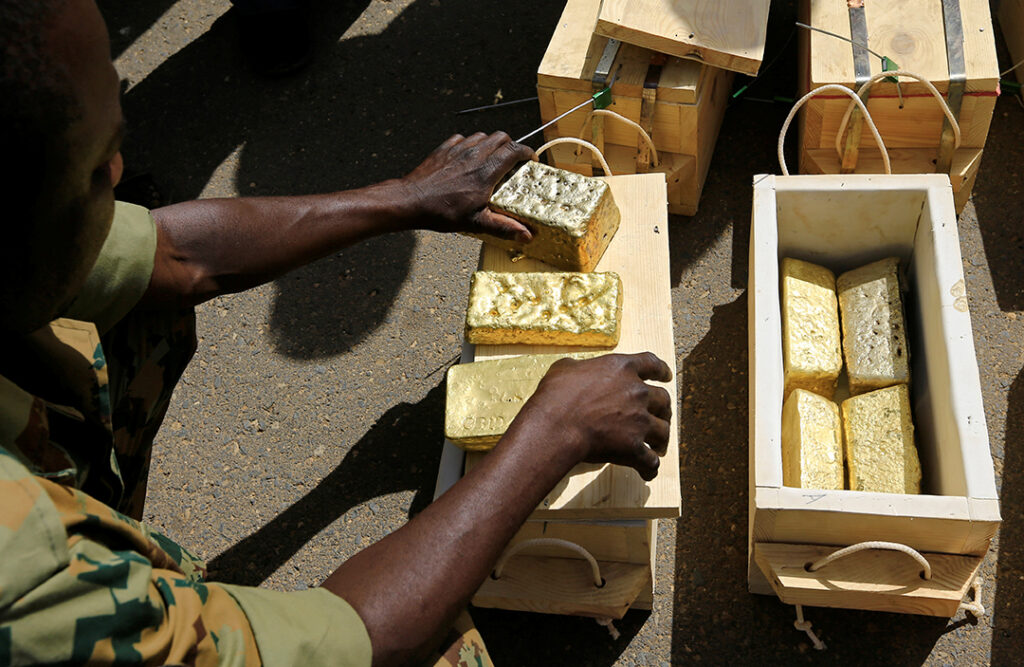ADF STAFF
On a street in Sudan’s capital, Khartoum, a poster appeared earlier this year with a succinct message accusing the ruling military junta of betrayal.
It read: “Russia supported the coup so it could steal our gold.”
There are many connections between Sudan’s coup leaders, who seized power in October 2021, and Yevgeny Prigozhin, who is one of Vladimir Putin’s closest advisors.
New reporting has revealed that Prigozhin is benefiting from hundreds of tons of gold removed from Sudan in recent years.
Also known as “Putin’s chef,” the infamous founder of Russia’s shadowy Wagner Group owns a mining subsidiary in Sudan called Meroe Gold Ltd.
Its operations have been studied by experts such as Denis Korotkov, an investigator at the United Kingdom-based Dossier Center, which tracks crimes by people associated with the Russian government.
“Through Meroe Gold or other companies associated with Prigozhin employees, he has developed a strategy to loot the economic resources of the African countries where he intervenes as a counterpart to his support to the governments in place,” he told CNN.
Shortly after Meroe Gold was created in 2017, its parent company, the Prigozhin-owned M Invest, signed a five-year deal with a military-linked security firm in Khartoum.
M Invest agreed to pay for the firm’s help in bringing M Invest personnel into the country and for “security and safety” services.
A Russian-made helicopter and gold-processing equipment were among the $11 million in goods Meroe has imported since 2017, according to Sayari Labs, a financial intelligence company that works to prevent financial crime and foster transparency.
The Organized Crime and Corruption Reporting Project (OCCRP), a global network of investigative journalists, published a report in November 2022 detailing Wagner Group interference in Sudan’s gold mining industry.
Based on leaked documents, OCCRP’s latest reporting showed that M Invest paid millions of dollars to a company operated by Sudanese military intelligence in exchange for residence permits and weapons for its Russian personnel in Sudan.
Anti-corruption expert Andrew Feinstein said M Invest’s deals with Sudan’s military are troublesome because the army has a reputation for being “deeply and systemically corrupt,” he told OCCRP.
Prigozhin’s Wagner Group, which is Russia’s top proxy of choice in Africa, primarily has been assisted by Gen. Mohamed “Hemedti” Hamdan Dagalo, a Sudanese military coup leader who has taken the role of vice president.
Experts say Hemedti’s family dominates the Sudanese gold sector, which is Africa’s third largest behind Ghana and South Africa.
About 70% of Sudan’s gold production is smuggled out of the country, according to the Central Bank of Sudan.
Richard Messick, a former senior operations specialist at the World Bank, said the partnership between the Wagner Group and the Sudanese military is bad for the country.
“The question is how these transactions [between Wagner and Sudanese military companies] are being conducted,” Messick told the OCCRP. “These are two really bad actors that shouldn’t be allowed to purchase arms, anywhere.
“If the payment is in gold, it needs to be shut down. If it’s through the international financial system, sanctioning authorities must make sure the companies and individuals associated with them cannot hold any [bank] account.”
According to leaked documents examined by the OCCRP, Meroe Gold shares none of its profits with Sudan, in violation of the country’s regulations, which state that all foreign companies are to give Sudan 30% of profits from extracting gold.
As M Invest has provided cover for Wagner’s hybrid operations in Sudan, its mining concessions continue to boost Russia’s estimated gold reserves of $130 billion.
Overwhelming evidence paints a picture of Russia colluding with Sudan’s military junta to loot Sudanese wealth, fund Russia’s war effort in Ukraine and buttress Russia against tightening international sanctions.
Experts have concluded that Meroe Gold is part of a scheme to move billions of dollars in gold from economically fragile Sudan to Russia.
Abdul Moniem Sidig, a senior member of the Sudanese Gold Exporters Association, has witnessed it firsthand.
“Sudan has lost a lot of its wealth,” he told Bloomberg. “Gold hasn’t contributed remarkably to improving the Sudanese economy.”

